Ever found yourself parched during a long drive with not a water bottle in sight? Or maybe you’ve been stuck in an unexpected situation where having a stash of water would have been a lifesaver? Understanding how to store water in a car can not only quench your thirst during long drives but also provide emergency backup when needed.
To store water in a car, you need to select the right containers, consider climate conditions, and ensure regular rotation for freshness. Using BPA-free water bottles, hydration bladders, or even spare tire compartments help too.
Continue reading to discover how you can remain hydrated on the go and be prepared for unexpected situations with well-planned water storage in your car.
Why You Should Consider Storing Water in Your Car
Whether it’s a regular day or an unexpected emergency, having water in your car can be a lifesaver. Dehydration can impair your mental and physical abilities, which can pose significant risks, particularly when you’re behind the wheel.
It’s also essential for those who love outdoor activities or for situations where you may be stranded due to unforeseen circumstances.
On long drives or during a car breakdown, your supply of water could be what keeps you going. Plus, in the event of natural disasters or situations where the water supply is compromised, having a stored stash in your car can provide the much-needed relief.
The Different Methods of Storing Water in Cars
With a good understanding of why you need water and how to store it in your car, you’re ready to look at different methods. Factors such as your trip duration, car space, and personal preferences play a role in the type of container you choose.
1. Using Bottled Water for Car Storage
Bottled water is the go-to choice for many due to its convenience. Sealed and protected from contaminants, these are a practical option for shorter trips.
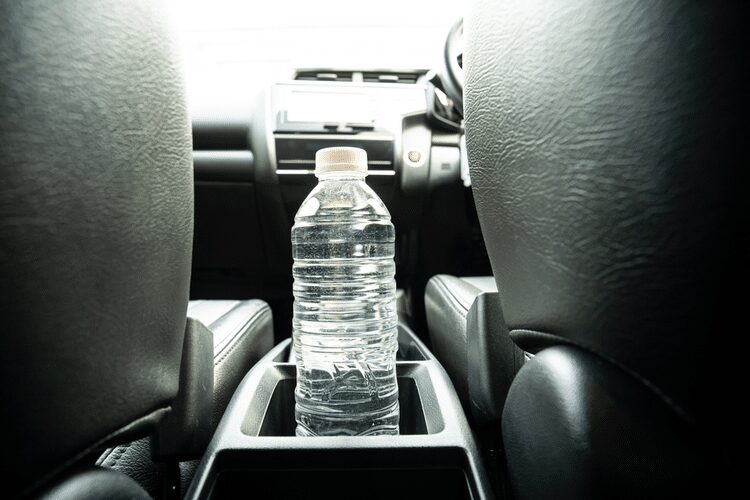
Keep in mind that it’s crucial to store bottled water away from direct sunlight to avoid chemicals from the plastic leaking into the water.
Although water doesn’t expire, the plastic can degrade over time. It’s important to check expiration dates and rotate your supply regularly to maintain freshness.
Furthermore, while convenient, bottled water can create unnecessary waste, so consider recycling plastic bottles or using glass bottles for water storage.
2. BPA-Free Containers for Safe Water Storage
BPA-free containers are an excellent option if you’re looking for safe and versatile water storage. BPA or Bisphenol A can potentially leak into the water from plastic containers, especially when exposed to heat.
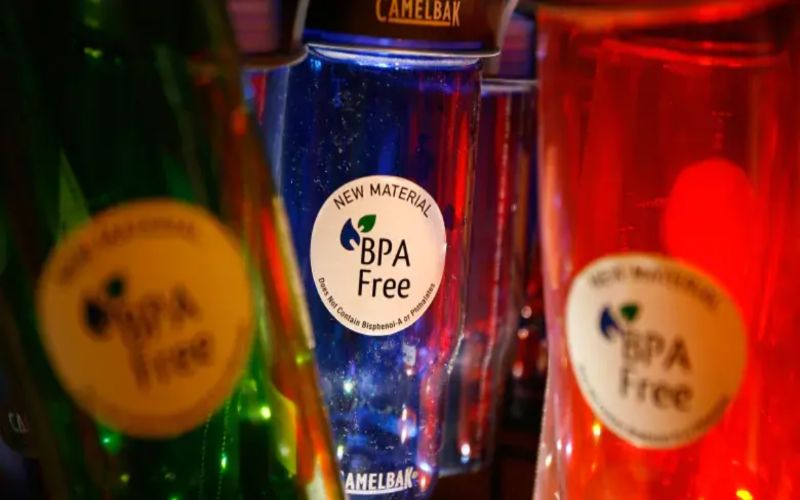
As such, using BPA-free containers ensures you have safe water on your travels.
These containers come in a variety of sizes, meaning you can choose according to your water needs and the available storage space in your car. Be sure to store them away from direct sunlight and rotate the water to keep it fresh.
Also, a tight-sealing lid is a must to prevent leaks and contamination.
3. Space-Efficient Containers for Water Storage
If you’re pressed for space but need to carry a significant amount of water, space-efficient containers can be the solution. Options like collapsible water bottles and stackable water jugs can help you optimize your limited space while ensuring you have enough water for your journey.
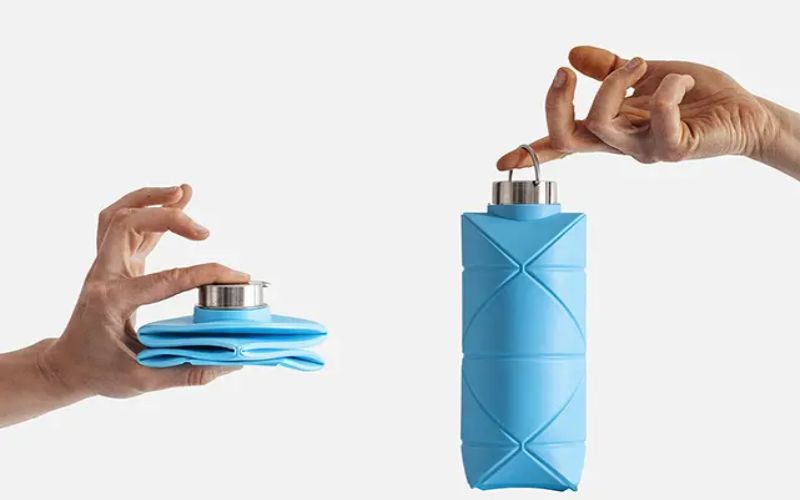
Collapsible bottles are compact, lightweight, and can be stored even in small compartments when not in use. On the other hand, stackable jugs allow you to utilize your car’s vertical space efficiently.
Regardless of the type you choose, ensure they are sturdy, leak-proof, and easy to handle.
4. Durable Water Jugs for Extended Trips
When embarking on long journeys or heading to remote locations where water might not be readily available, consider using durable water jugs.
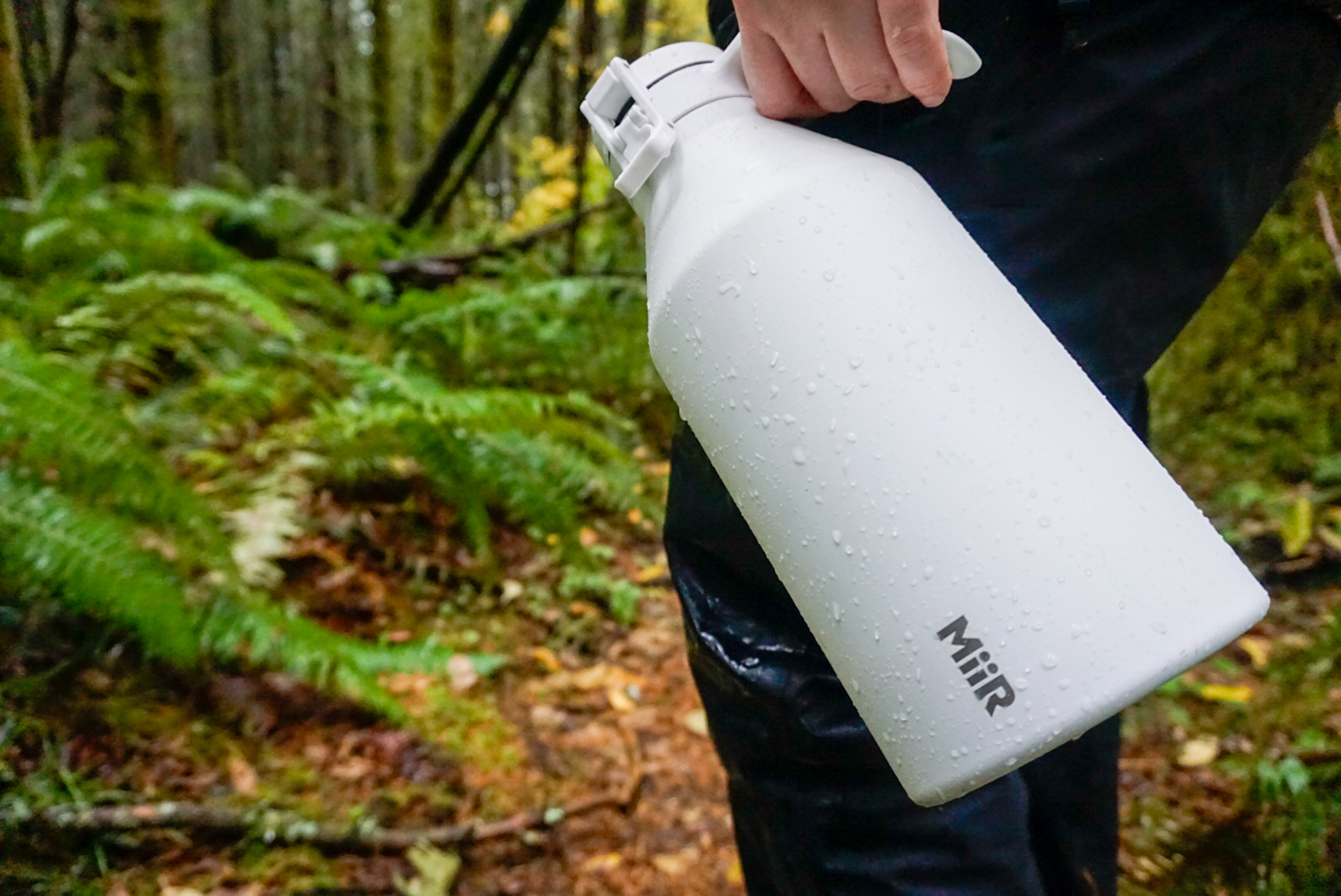
Water jugs are designed for heavy-duty use and can withstand rough handling. They are especially helpful for camping or similar outdoor activities.
These jugs come with tight-sealing caps to prevent leaks and sturdy handles for easy transportation. Some even have a spout for convenient dispensing of water. As with other containers, ensure they are stored securely in your car to avoid any movement or spills while driving.
Tips on Storing Water in Cars
Now that we have covered the different containers for storing water in cars, let’s consider the specific conditions that might affect your water storage.
How to Store Water In Colder Climates
Storing water in your car during colder climates presents its challenges, primarily the risk of freezing. An excellent solution to prevent this is to use insulated containers. These containers are specifically designed to keep the contents at a consistent temperature, which can help to slow down the freezing process.
If you’re staying in a heated room, this can help prevent the water from freezing. However, keep in mind that if the water does freeze, it’s not wasted. Frozen water can still be used in emergencies, such as for cooling down your car’s engine if needed.
Lastly, bear in mind that the placement of your water storage can influence how quickly it freezes. Try to store your water in the car’s interior, where it’s likely to stay warmer for longer. Even so, always be prepared for the possibility that your water may freeze, and plan your water usage accordingly.
How to Store Water in Hot Climates
Hot climates also pose a challenge for storing water in cars. The primary concern is the heat’s effect on the water, especially when stored in plastic containers. Excessive heat can cause chemicals from the plastic to leach into the water, which could potentially be harmful.
One way to mitigate this risk is to use insulated containers, similar to the suggestion for colder climates. However, the goal here is to keep the water cool and prevent it from reaching high temperatures. Insulated containers can help maintain a lower temperature, ensuring the water remains safe for consumption.
Avoid leaving your containers in direct sunlight or in areas of the car that heat up quickly, like near windows or under the windshield. Instead, opt for the coolest part of your car, which is often the trunk. Try to create some form of insulation, like a blanket or a cooler box, for your water containers.
Rotating and Replacing Stored Water
Keeping your water supply fresh is crucial regardless of your climate or type of container. Although water doesn’t expire, it can develop an off-taste over time, especially when stored in plastic containers. To avoid this, make a habit of regularly checking your water and its containers.
One of the most effective ways to ensure the freshness of your water is by rotating your supply. This involves consuming the water you have stored and then replacing it with fresh water. A general rule of thumb for long-term water storage is to replace your supply every six months.
Creative and Space-Saving Solutions for Car Water Storage
Sometimes, standard solutions may not be enough, or you might want to utilize your car space more efficiently. In these cases, you can get creative with your water storage.
Storing Water in Automotive Spare Tire Compartments
The automotive spare tire compartment can be an efficient, creative solution for water storage. These often-unused spaces are generally large enough to store smaller or flexible water containers.
However, to make this work, you need to choose the right kind of water container. Opt for something flexible yet sturdy that can withstand the car’s movements without getting damaged. Always secure the containers to prevent them from moving around while driving.
Storing water in the spare tire compartment might not be the first place you’d think of, but it can be surprisingly efficient. It uses space that would otherwise be wasted, while keeping the water out of direct sunlight and relatively cool.
Using Hydration Bladders for Convenient Access
Hydration bladders are a fantastic solution for those looking for both storage and easy access to their water. Originally designed for hikers and outdoor enthusiasts, these flexible, durable containers have a place in car water storage too. They can be comfortably accommodated in a variety of spaces in your car.
One of the major advantages of hydration bladders is their flexible nature. This allows them to be hung from hooks, placed in seat pockets, or laid flat in the trunk. They’re also lightweight, making them a convenient option for those who may need to take the water with them when leaving the car.
The access to water that hydration bladders provide is unbeatable. With the built-in hose, you can drink directly from the bladder without needing to access the main storage area.
Advanced Car Water Storage Options
Beyond simple storage, there are more advanced options available for those who want to ensure they have a reliable supply of clean water in their cars.
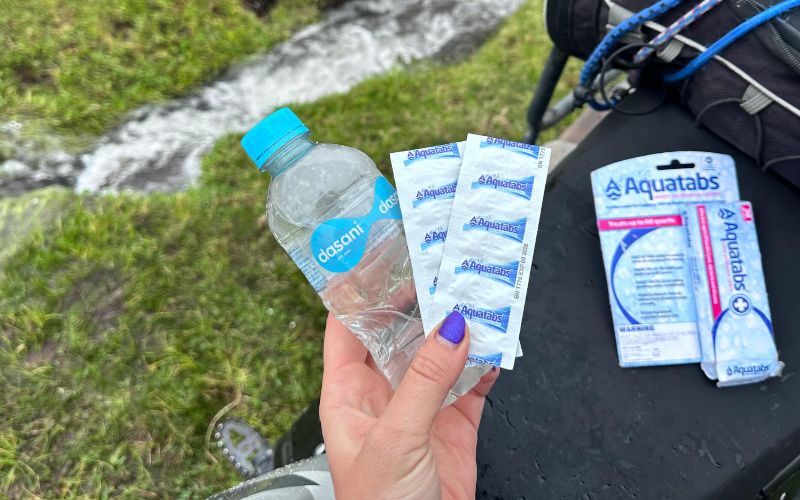
Using Water Purification Tablets and Personal Filters
For those looking to ensure the safety of their stored water during long trips or emergencies, water purification tablets and personal filters are an excellent solution. Compact and easy to use, these tools can provide an additional layer of safety for your water supply.
Water purification tablets work by killing bacteria and other harmful organisms in the water. They are lightweight, easy to store, and effective, making them a smart addition to your car water storage system. However, it’s essential to follow the instructions on the packaging to ensure they work effectively.
Personal filters are another fantastic tool to have on hand. While they’re slightly larger than water purification tablets, they’re still compact enough to be easily stored in your car.
Using Car-Compatible Water Distillers or Purifiers
For those serious about their water safety, car-compatible water distillers or purifiers are the ultimate tool. These devices offer a higher level of purification than tablets or filters, ensuring your water is as clean and safe as possible.
Car-compatible water distillers work by boiling the water and then condensing the steam, which leaves behind impurities. This is an effective method of removing a wide range of contaminants, but the process can take a while.
On the other hand, purifiers use different technologies, such as UV light or reverse osmosis, to remove contaminants. They’re usually faster than distillers but may not remove as wide a range of impurities.
Stay Hydrated on the Road with Effective Car Water Storage
Storing water in your car is more than just a convenience; it’s a critical part of being prepared, no matter what the journey ahead might bring.
With a variety of storage methods and advanced options available, you can find a system that fits your needs and your car. Stay hydrated, stay safe, and enjoy the peace of mind that comes with effective car water storage.
For food, you might be interested to learn about how long does freeze-dried food lasts.
